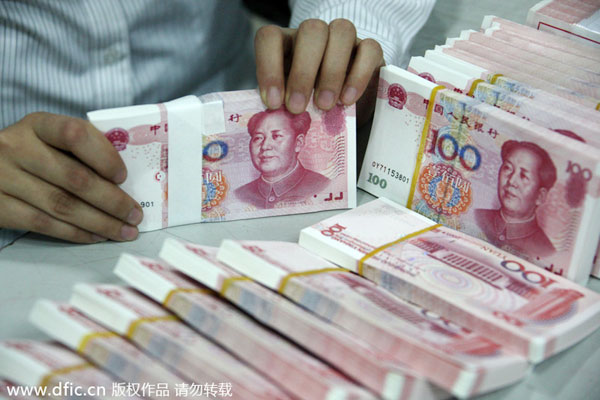 |
|
A clerk counts yuan bills at a bank in Huaibei, East China's Anhui province. [Photo/IC] |
The Group of Seven countries are in fundamental agreement that the Chinese yuan should be part of the IMF's international basket of reference currencies, but there is no need to rush, German Finance Minister Wolfgang Schaeuble said on Friday.
"There are technical issues and not just technical ones" to sort out, Schaeuble told a news conference at the end of a meeting of G7 finance ministers and central bank governors in Dresden, Germany. "We are in full agreement on the goal, but it would not be good to rush it," he added.
Beijing has been pushing for its currency to play a greater role in the world financial system and be included in the basket that makes up the International Monetary Fund's "special drawing rights" reserve currency. The IMF said on Tuesday that the yuan is "no longer undervalued".
Experts believe the yuan may officially become a global reserve currency by the end of the year. Inclusion in the basket could increase its use internationally.
The IMF began holding meetings this month to review the status of the Chinese currency and discuss whether it could be added to the special drawing rights basket. Results of the SDR review, which is conducted every five years, will be available by December.
The basket currently includes the US dollar, euro, British pound and Japanese yen. Adding the yuan would require the approval of more than 70 percent of IMF members. The IMF discussions are focusing on whether the yuan canbe used freely in cross-border trade and financial transactions. Other issues include whether the yuan can be used as a reserve asset, the trading volume in the foreign exchange market and whether it can be hedged with the use of derivatives.
In a research note, Australia and New Zealand Banking Group said that using these criteria, the yuan could get a higher score than even the yen in a simulation.
"So the Chinese currency is qualified to be included in the SDR basket," it said.
According to data from the Society for Worldwide Interbank Financial Telecommunications, which handles transfers for global financial institutions, the yuan became the world's fifth-largest payment currency in December, passing the Canadian and Australian dollars.
"The yuan is likely to be the third-largest international currency within five years," said Liu Ligang, ANZ's chief economist in China.
China passed the United States as the world's largest trading nation in 2013. Liu forecast that by the end of the year, more than 30 percent of China's cross-border trade will be settled in the yuan.
More than 30 central banks are believed to have already begun reserve diversification into the yuan. China also widened the yuan's trading band, and its valuation has improved.
"The Chinese currency is much more usable and IMF politics are more supportive," said Tamara Henderson, an economist at Bloomberg.
"As the world's second largest economy, and with growth robust as many developed countries remain stagnant, China now has greater heft in international decision-making.
"Since China's economic power is only likely to grow, the granting of SDR status at this stage would be an important gesture of goodwill."
Earlier this year, the country's foreign exchange regulator changed the calculation method for the balance of payments to meet IMF requirements. The changes included putting reserve assets under the financial rather than the current account.
Adopting such global norms will support the yuan's inclusion in the SDR basket, said experts.
AFP contributed to this story.
